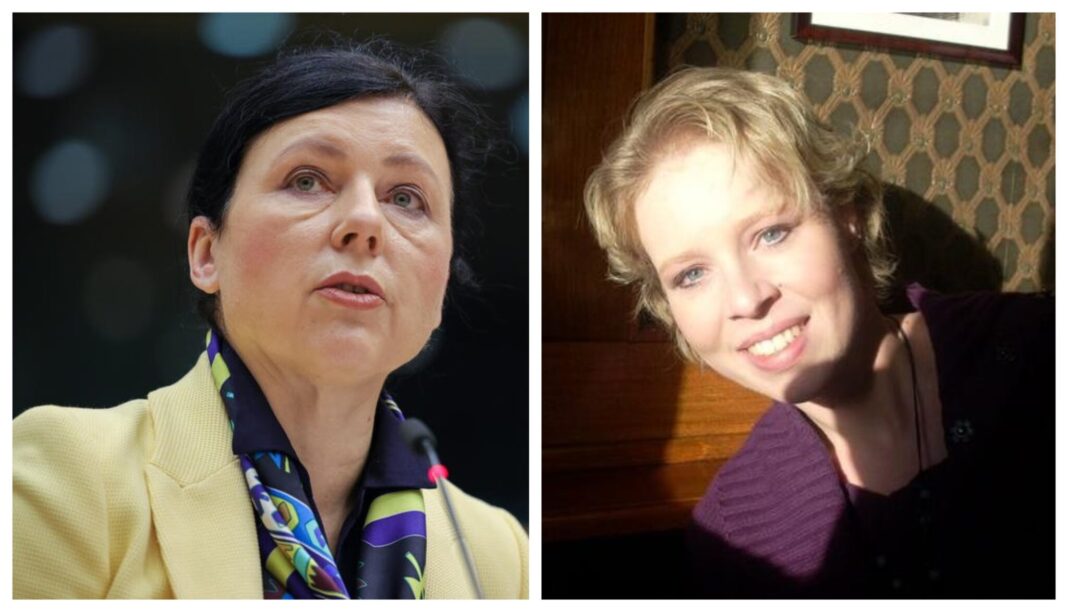By: Nina Žoher
While the European Commission Vice-President for Values and Transparency, Vera Jourová, is saying that Hungary and Poland are supposedly a threat to the rule of law in the Europan Union, she is clearly forgetting that a biased judiciary is also a real threat to maintaining the rule of law. The case of Urška Klakočar Zupančič, head of one of the departments at the District Court in Ljubljana, which was pointed out as problematic by the former Minister of the Interior, Vinko Gorenak, Ph.D., is a very clear example of how the impartiality and independence of the judiciary are being diminished. Namely, the judge expressed her political views on Facebook.
The Constitution of the Republic of Slovenia stipulates that Slovenia is a democratic and a social state, governed by the rule of law. In addition to the separation of legislative, executive and judicial powers, the Constitution also stipulates that all people are equal before the law and prescribes the independence of the judiciary as a key precondition for the existence of democracy. In accordance with Article 125 of the Constitution, the judges must be independent in the performance of their judicial function and must be bound by the Constitution and the law in their work. However, as the function of a judge is permanent, the judges should consistently make sure that they are not diminishing the judiciary’s impartiality.
In one of her posts on Facebook, judge Urška Klakočar Zupančič announced that “the Prime Minister Janez Janša ordered the police officers to go to the streets and to the borders between the municipalities, to collect fines,” at a government session. Vinko Gorenak, Ph.D., State Secretary in the Prime Minister’s Office, who has not missed a single government session, assured that Janša gave no such order to the police, as he cannot and should not do that. However, the judge did not stop there – she also praised the rhetoric of the self-proclaimed immunologist Marko Potrč, suggesting, among other things, that the doctors Beović, Krek and Bregant, the government spokesman Kacin and Janša were “frustrated individuals with a criminal past.” Her views were also condemned by the President of the Supreme Court, Damijan Florjančič.
However, the example of the judge in question is more the rule than it is the exception. Let us mention, for example, the judges from the District Court in Maribor, Matjaž Štok and Slavko Gazvoda, who were part of one of the traditional meetings of the Social Democrats party at Sv. Urban above Maribor. And what is even more worrying is that judge Štok was dressed in the colours of the SD party and wore a Che Guevara-style cap on his head. Unlike his colleague, judge Gazvoda wore a black T-shirt with a red star motif. In a country that is supposed to be democratic, the judge put on a shirt with a symbol of totalitarianism on it – despite the fact that has been presented by some historians, who say that communism killed a total of 200 million people in the 20th century.
Another among the more well-known cases where the independence of the judiciary was questioned, is undoubtedly the case of judge Vesna Pavlič Pivk, who paraded around with a Titovka (the famous green cap that was worn by the Yugoslav Partisans in World War II, and later the Yugoslav People’s Army) on her head and a Yugoslav flag in her hands, at one of the birthday parties.
Focused on other things
The European Commission Vice-President for Values and Transparency, Vera Jourová from the Czech Republic, who was arrested at the Prague airport in 2006, after being accused of corruption, and even spent thirty-three days in detention, prefers to deal with Poland and Hungary, instead of the issue of a biased judiciary. Interestingly, back in April, she even admitted that there was little cause for concern in Hungary, but then she apparently changed her mind. Jourová is also concerned about the Slovenian media, as she contacted the Slovenian authorities to discuss the importance of media freedom, the safety of journalists, and support for the media in these difficult times. Of course, she forgot about the fact that in Slovenia, the media cartel controls as much as 90 percent of the media market, and it cannot accept the fact that there are currently no leftists in power, who are used to simply taking the right to power and truth for themselves.

